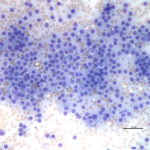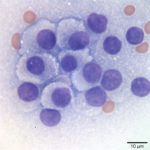Lymph node aspirate from a dog
Case Information
A 5-year old spayed female mixed breed dog (64 pounds) presented to the oncology service at Cornell University Hospital for Animals for further evaluation of a mass present for roughly one month on the ventral right side of the throat, alongside the trachea. On physical examination, the mass was approximately 7 cm in diameter, firm, and appeared deeply attached and not freely movable. A complete blood count, clinical chemistry profile, and urinalysis showed no significant abnormalities. A free T4 level ordered by the referring veterinarian was within normal limits. Thoracic radiographs and abdominal ultrasonography revealed no evidence of metastasis. However, a CT scan of the head and neck discovered right medial retropharyngeal lymphadenopathy (3.0 x 1.9 x 1.5 cm) in addition to the primary mass. Aspirates of the right medial retropharyngeal lymph node were submitted for cytologic evaluation.
Review the photomicrographs below and answer the following questions:
- Into which general tumor category would you classify the neoplasm (e.g epithelial, mesenchymal, round cell, endocrine/neuroendocrine)?
- Given the anatomic location of the primary mass, what are your top differentials?
- Does the unremarkable chemistry profile help rank your differentials?
 |
 |
Answers on next page
